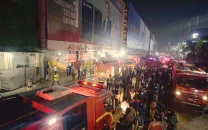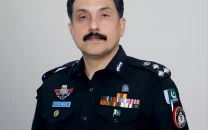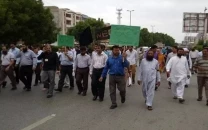Trickle-down effect: The dictator, the cantonment and the missing budgets
Clifton cantt board can’t announce its ‘Rs2b’ outlay for next year.

Dictators bring with them the death of democracy. Musharraf was particularly astute about making sure this happened in Pakistan’s 50 cantonments. One decision in particular he made early on in his regime continues to bear bitter fruit today: they have not had board elections for 15 years and this has affected their budgets today.
In Clifton Cantonment Board’s case, the budget for 2014-15 should have already been announced. But because cantonment boards across the country don’t have elected boards, their finances are in limbo.
Going by the general trajectory of Clifton cantonment’s revenue and earnings, it is safe to say that the budget is in the two-billion-rupee ballpark. But CEO Adil Rafi Siddiqui can’t give its exact figure because technically the board has to approve the budget. Right now the actual board, which would hold a meeting to go over the finances, doesn’t exist.
Why has this happened?
When Musharraf came to power he made some changes. To put it extremely simply, he did away with elections for cantonment boards and decided that these areas would be run by two handpicked administrators (a civilian and a military officer). And so, for 15 years the cantonments have been running under what they called a ‘varied’ constitution, which is an “alternate arrangement” that is adopted when there is no elected board. This ‘varied’ status would, however, last only one year and the federal government would have to renew it each year.

The only problem is that this ‘system’ was not renewed in 2013. Last year, the Supreme Court barred the federal government from doing this any further after September 2013 and asked it to hold elections in the cantonments by that date. So, since Sept. 2013, the boards have been in limbo. This has, as a result, affected their budgets.
Elections and future
Elected cantonment boards should have civilian members. The idea is that a civilian will protect the interests of the civilian population living in cantonments. Cantonments are not just areas where army men live, there are plenty of civilians there and even retired people, point out people like Col (retired) Inam, a lawyer in Rawalpindi. He also says that because of the choice of who ran the cantonments (as in handpicked administrators), over the years certain areas in cantonments that were poor were neglected while elite ones were given more attention.
For the elections to take place, though, the laws need to be changed and constituencies (UCs or wards) need to be marked. The Election Commission of Pakistan set the wheels in motion. But when amendments to the law were being considered, certain recommendations were not well received. “They started hitting at the basics,” said Clifton Cantonment CEO Adil Rafi Siddiqui. They said that the board’s president can’t be a “fauji” and the board should only have elected and not nominated (or serving military) members.
“Cantonments aren’t ordinary areas,” argues Siddiqui. He feels that as they contain sensitive defence installations, civilian understanding and access to information about managing them is naturally limited.
For his part, Siddiqui says he has written to the directorate of Military Lands and Cantonments and urged for some progress to be made. Since the varied constitutional status doesn’t even exist, they are suspended. This means that in Clifton commercial building plans, for instance, can’t be approved by a board. Tenders for outsourced services such as charged parking are also affected, putting a potential squeeze on revenue.
“We are in the doldrums,” admitted Syedah Imammah Ali, the deputy executive officer for Clifton cantonment who works on revenue generation. She added that certain development projects for next year, such as work on Korangi Road, Sunset Boulevard and water filtration plants are thus going to be on hold.
Why Clifton cantt cracks the whip on tax collection
When it comes to collecting taxes, Clifton cantonment puts the Karachi Metropolitan Corporation to shame. But there is a very specific reason for this.
“We have no external budget which is why we are so religious about tax collection,” explains CBC CEO Adil Rafi Siddiqui.
The main difference between the Clifton cantonment and Karachi Metropolitan Corporation budgets is external funding, says the CEO. Clifton doesn’t get any handout grants or packages from the Sindh or federal government as KMC does. In fact, this is basically how KMC keeps itself afloat. Last year, for example, it was given roughly Rs19 billion as its share of the octroi and zilla tax or GST, grants in aid, property taxes and development funds.
“Why are we not getting [this] attention,” asked Siddiqui. The CBC doesn’t get a share of the OZT/GST because cantonment areas were not included in the national finance award, he explains. “But that is a lame excuse,” he adds.
A small explanation is due here on the OZT. This tax was charge for movement of goods between the districts. Income from it helped pay for KMC salaries at least. But in 1999, the federal government scrapped this tax and increased the General Sales Tax (GST) from 12.5% to 15% to make up for it. The provinces would get the revenue from the extra 2.5% as compensation for the loss of OZT revenue. They were meant to give this money over to local government.
But as Siddiqui points out, the cantonments don’t get this share, which can be a lot of money. KMC, for example, got Rs7.9 billion in OZT/GST alone two years ago. But it doesn’t make sense because GST is collected across the city and in Clifton cantonment as well. Why shouldn’t it get a portion of it?
In the absence of such funding, the CBC tends to rely on property tax which is its strongest earner. It also earns by charging for conservancy, water, building fees, billboards. Syedah Imammah Ali, the Clifton cantonment deputy executive officer, who is involved in revenue generation, stressed that generally she has found that the residents of their jurisdiction are responsible citizens and will pay, provided the CBC does its job in return. They have 64,000 tax payers, which includes households and commercial establishments. This makes Clifton a fairly large area if you compare it with say, Malir cantonment with roughly 15,000.
Published in The Express Tribune, July 13th, 2014.
Published in The Express Tribune, July 13th, 2014.



















COMMENTS
Comments are moderated and generally will be posted if they are on-topic and not abusive.
For more information, please see our Comments FAQ